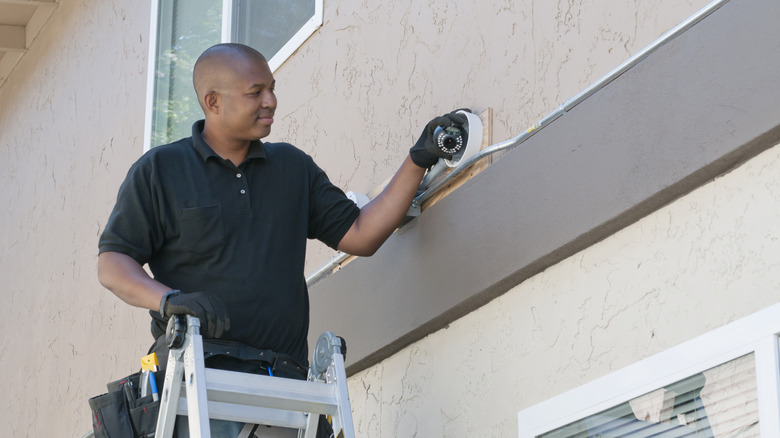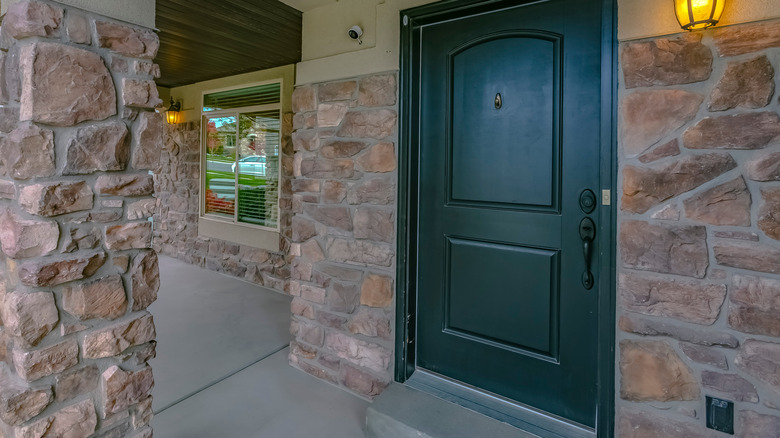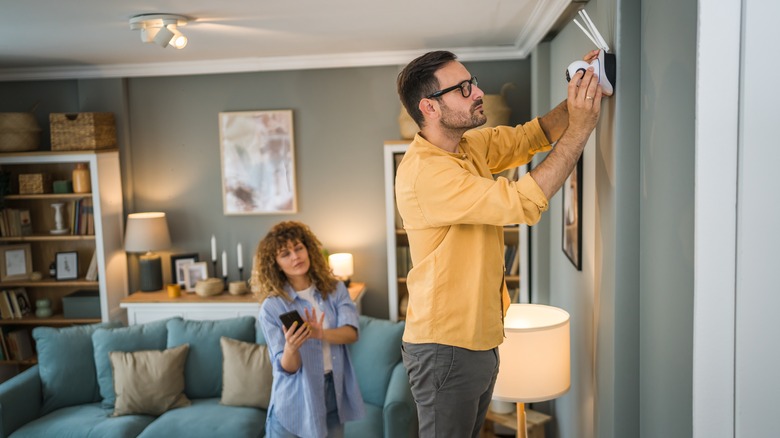Where To Place Your Home Security Camera For Maximum Results
Security cameras are an increasingly popular form of home protection, and it's not hard to see why. A study by the University of South Carolina at Charlotte found them to be over 40% effective at deterring burglaries. Even if the worst happens, having cameras can provide crucial evidence for solving a crime after it happens.
However, while it's easy to spend hours researching the perfect security cameras for your home, placement is a key factor that should not be overlooked. Should the cameras be clearly visible, or hidden away? High or low? For example, doorbell cameras can have hidden downsides, and they don't usually cover the most vulnerable areas of a home: ideally, you'd want the camera to show everything that happens to all the doors and windows of the first floor, since that's where break-ins are most likely to occur.
So, when you're figuring out how to choose the best security system for your home, it's also crucial to identify your home's weak spots, particularly if your budget limits you to only a few cameras. Here's where you should set up security cameras to stand the best chance of catching a trespasser red-handed, whether they're simply scoping out your driveway or they're already rummaging the halls.
Outdoor cameras should visibly cover entry points
One of the biggest questions people face when setting up their cameras is deciding whether the cameras should be visible. When interviewed by news station KTVB7, a majority of convicted burglars said that they would leave a home alone if they noticed that it had security cameras. However, some interpreted visible cameras as a sign that there were valuables inside the home, and they would just have to be more careful to reach them. The overall lesson here is that it's probably better to have your cameras visible, but in the long run, the focus should be on covering important areas where someone might actually break in.
To determine where your cameras should go, you might need to do a little mental roleplaying. Ask yourself, "If I were planning to break into this house, where would I go?" For most homes, the doors and windows on the first floor are common entry points. Don't forget the garage door too! If you can get the camera to cover the driveway and nearby road, that's even better; many criminals will walk right up to the front of the house first to see if anyone is home, and they may also bring a vehicle to make a quick getaway and haul off any valuables. Secondly, try to have a camera pointed at any secluded, vulnerable windows, such as a window facing an alley between houses or a window with an AC unit. Parents may also want to have a camera viewing their child's bedroom window.
Strategically place your indoor cameras
Should you set up security cameras indoors? Some people find indoor security cameras a bit invasive, and Airbnb's unexpected home security ban set a new standard for rental property owners, but if you live in an area with high burglary rates, it can be a wise move. Residents of apartments may also depend on indoor cameras if they aren't able to attach them outdoors. Most of the key camera locations for houses still apply to apartments, such as the front and back doors, porch, or balcony (high-rise balcony break-ins may be uncommon, they're not unheard of). For enclosed porches or balconies, mount the camera in the corner and point it at the door.
You may also want to keep a camera in the living room, home office, or another communal space where valuables or a locked safe are kept. Electronics are some of the first things many burglars go after, so it's wise to point the camera toward them. Many people store jewelry, cash, and other valuables in the primary bedroom or bathroom, but to preserve privacy in these locations, you can mount a camera in the main hallways or stairwell that they're likely to pass through on their way to these rooms. All in all, once you've set up these cameras, both outside and inside, you'll have effectively made your home safer — and ensured that if someone does break in, their actions will be clearly recorded.


